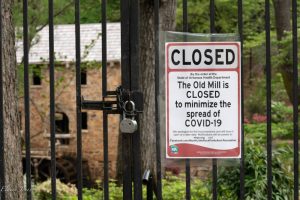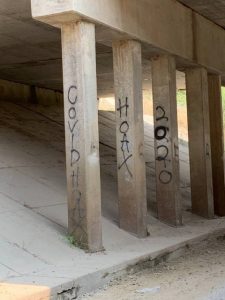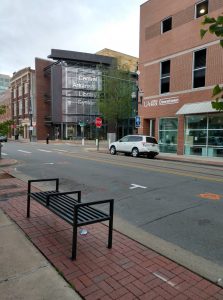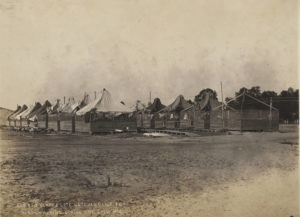calsfoundation@cals.org
A Strange and Historic Time: Chronicling the COVID-19 Pandemic in Arkansas
We are near the end of another year affected by the global COVID-19 pandemic, and we’re taking stock of the work we’ve done at both the CALS Roberts Library and the CALS Encyclopedia of Arkansas to document this crisis for future generations. Just as we have the chance to learn from soldiers’ and others’ wartime experiences due to the work of the journalists and photographers who captured that history in real time and the archivists and historians who preserved it, we want to offer that same chance to future students of history. To paraphrase the popular musical Hamilton, “history has its eyes on us” during this unprecedented time.

As one of a number of recent community history projects, the Roberts Library/Butler Center for Arkansas Studies’ Documenting COVID-19 Pandemic project seeks to collect and preserve materials dealing with life in Arkansas during COVID.
The homepage for the ongoing project states:
Our community is in the midst of a historic event. Future generations will want to know how we lived through the Coronavirus (COVID-19) pandemic in 2020. The CALS Butler Center encourages members of our Central Arkansas community to document their experiences during this time of crisis. We are looking for diaries, photographs, poetry, oral history interviews, artwork, video, etc. How are you spending these days? How has your life been affected? Share those details with us here.

The results of this project to date show how Arkansans were affected by the shutdowns, shortages, and mask requirements, as well as illness suffered by themselves or loved ones. Compiled questionnaires and other documents are available here, and photographs are available here.
The collection includes images that show people using their creativity to make the best of a bad situation, people putting on masks and moving forward as best they could as the world opened up more, and people turning to expressing their feelings through graffiti and conspiracy theories.

Brian Robertson, manager of the Research Services Division of the CALS Butler Center for Arkansas Studies at the CALS Roberts Library, says this of the project:
The past couple of years have been a challenge for everyone. COVID is still with us, and it continues to tax us in various ways. In spite of these difficulties, the Butler Center is charging forward with its mission of documenting and preserving Arkansas’s history. One way that we are doing this is by collecting material on COVID’s effect on our communities. It is critical that we do this in order that future generations have a better understanding of the pandemic. Thus far, we have received dozens of photographs and questionnaires from people around the state. I know there are many stories out there, though, that we have not yet discovered. To that end, we are hoping that people will continue sending us material that provides insight into the pandemic’s effect on them. Additional stories from individuals will allow us to paint a fuller picture of how the pandemic has affected us all.

The CALS Encyclopedia of Arkansas (EOA) has also published a detailed and frequently updated entry on the pandemic, which is invaluable to journalists and others who want to see the progression of the pandemic in Arkansas, from the first detection in the state in March 2020 moving forward to the end of 2021 and beyond.
As Guy Lancaster, editor of the EOA, says:
I’ll be the first to admit that the COVID-19 entry on the EOA is far longer than it really needs to be at present. But this is part of the challenge of doing history that intrudes upon our present—you never really know what will be relevant from the remove of even just a few months. As time passes, however, we’ll be able to consolidate certain parts of the entry, especially as patterns start to emerge in the story of the pandemic, making it easier to summarize, to draw previously disparate bits of information together into more of a narrative.

Finally, Arkansas, like the rest of the country, is no stranger to pandemics and other health emergencies, as evidenced in the series of lectures sponsored by the EOA called “Monday Maladies.” The online lectures, which are available to watch on the CALS.org YouTube channel, featured such subjects as hazards of medical practice in the state’s past, pandemics and the spread of disease in Arkansas, disease during the Civil War, and the great influenza epidemic of 1918. The Butler Center also holds documents and photos capturing the history of the flu in Arkansas, including several letters and newspaper articles that detail daily life during that pandemic a century ago. A century from now, historians and others will be looking back in the same way, trying to make sense of what happened and how people faced it.



